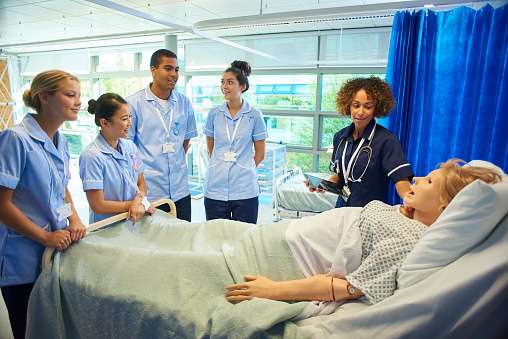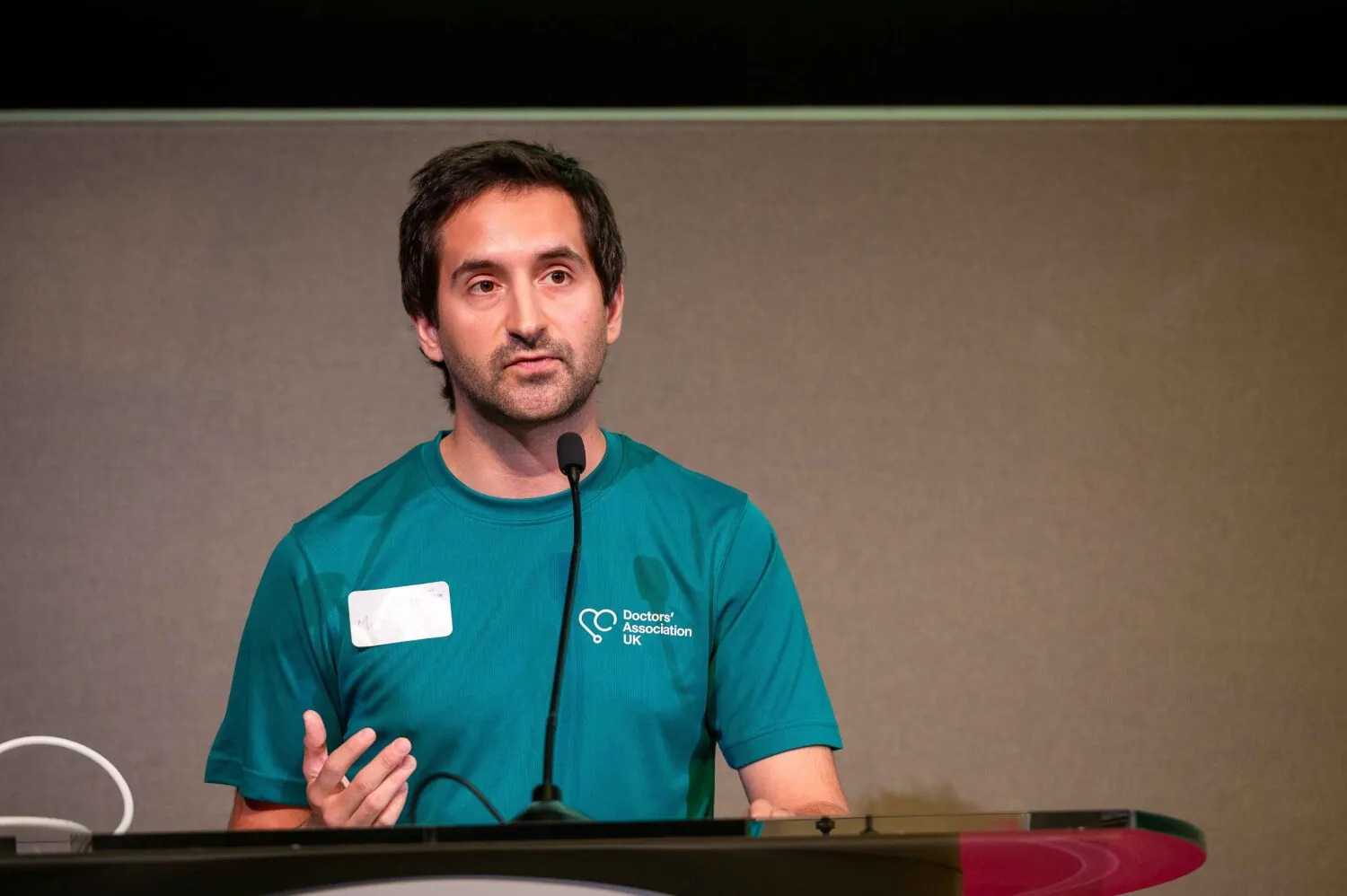
(Bloomberg) — U.K. health minister Matt Hancock was surrounded by cameras as he visited a family doctors’ practice in north London to hail the rollout of a new coronavirus vaccine. Unfortunately for him, the clinic hadn’t yet received its promised delivery of shots.
“We were expecting our first AstraZeneca 400 today,” Dr Ammara Hughes from the Bloomsbury Surgery told Sky News. “But we’ve had a push-back for 24 hours so we’re now getting that delivery tomorrow.”
The encounter, which played out on national TV Thursday, neatly encapsulated the logistical issues facing the government’s highly ambitious vaccine rollout. Prime Minister Boris Johnson has pledged to deliver 15 million shots to the most vulnerable people in the U.K. by the middle of February — just five weeks away — and said everyone will be within 10 miles of their nearest vaccination center.
The government’s record on meeting its targets during the pandemic has been patchy at best and even Johnson concedes his latest goal is a “big stretch.” In the first month of the vaccine program only one tenth of the total — about 1.5 million people — have received injections, leaving the vast bulk still to do. Yet the prime minister has little choice but to aim high.
The U.K. is at the epicenter of Europe’s struggle to contain Covid-19, with daily infections at a record and the worst death toll in the region, at almost 80,000. One in 50 people in England has the disease, according to official estimates, and Johnson this week locked the country down for a third time, shutting schools and ordering the population to stay home.
The national lockdown threatens to push the U.K. back into recession. Battered retail and hospitality businesses have been hit again, leaving Johnson’s government firefighting an economic crisis with unprecedented borrowing, as well as a health emergency that continues to get worse.
The one bright spot in Britain’s virus story is its approach to the vaccines. The U.K. was the first country in the western world to approve a Covid immunization last month, giving the green light to the Pfizer-BioNTech shot, and is significantly ahead of its European neighbors with delivering injections.
The key to lifting the lockdown is getting the disease under control and the key to that is getting enough people vaccinated. That’s why the Department of Health’s “entire focus” is now on the mass immunization program, according to one government official. “The vaccine is the closest to a silver bullet we’re going to get,” the person said.
Nevertheless the worry among officials is that once again Johnson has been over-optimistic in his promise and the government will fall short — either of reaching the magic 15 million elderly and vulnerable people, or of being able then to lift the lockdown enough to satisfy the public.
Behind the scenes, problems are starting to emerge. The fate of Johnson’s project is now entirely in the hands of the drug companies manufacturing the vaccines. Hancock, the U.K.’s most senior health minister, said on Jan. 6 the only thing limiting the speed of the roll-out was the supply of the “juice” from these drug-makers.
Privately, people familiar with the companies’ supply chains dispute Hancock’s message. They say they are on track to produce exactly what the government ordered but safety checks by an arm of the U.K.’s regulator are slowing the delivery down. In a statement Friday, the regulator said it was constantly looking at ways to speed up testing.
The “fill and finish” process — by which the vaccine is put into vials and packaged up — also takes time. In Parliament, Hancock was asked why one U.K. manufacturing plant in north Wales, run by pharma firm Wockhardt, was not working seven days a week to deliver the nation’s most urgent priority.“It can fill and finish vials only at the speed at which the vaccine material, which is a biological material, not a chemical compound, can be produced,” Hancock replied. Ravi Limaye, managing director of Wockhardt U.K., said the factory was working “at pace to meet the approved production schedule.”
So far, just four million doses of the AstraZeneca vaccine have gone through the fill and finish process, according to a person familiar with the situation. But there are another 15 million Astra doses in the U.K. waiting to be put into vials. AstraZeneca declined to comment.
Pfizer has so far handed over about five million doses to the U.K. A Pfizer spokesperson said the deliveries were on track to meet the schedule the company has agreed with ministers.
There are hopes the picture will improve. By late January, AstraZeneca is planning to have two million doses available each week, according to a person with knowledge of the target. Officials say that is the kind of bulk that will help the government meet its goal — but only if those doses can be processed and delivered around the country too.
For doctors in England, the politics is irrelevant when they can’t get the doses they were promised to inject into their patients’ arms. The Royal College of General Practitioners said last minute changes to vaccine delivery schedules were creating “confusion” for patients and “a lot of hard work” for medics.
The British Medical Association, which represents doctors, said some practices were also “struggling with supply issues and experiencing delays.” These logistical challenges are “inevitable although understandably very frustrating.”
Ministers have drafted in the army to help with the vast operation needed to move millions of doses around the country. A national booking service is being set up and hundreds of vaccination centers are opening in sports stadiums and other venues.
A government spokesman said the NHS is doing “everything possible to roll out doses as quickly as they can be supplied and quality checked.” The AstraZeneca shots are being sent to family doctors and vaccinations will be taking place at more than 1,000 sites by the end of this week, the spokesman added.
But some healthcare workers are frustrated that their offers to help inoculate are being ignored.
Michael Keen, chief executive of the Kingston and Richmond Local Pharmaceutical Committee, which represents 78 pharmacies in his part of south west London, said they’d been told they could roll out the vaccine from next week but had not been given any logistical information so have been unable to prepare.
The government is focused on mass vaccination sites, but these are not ideal for many older and vulnerable people, Keen said. “Elderly patients want to go to their local GP, their local practice, their local pharmacy,” he said.
Dr Rosie Shire, a general practitioner in Warrington, northwest England, who speaks for the Doctors’ Association, said she had heard from colleagues on maternity leave and retired doctors who want to get involved but had not yet been told how they can do that.
Even if the vaccines are made quickly enough, poured into injection vials fast enough, and distributed to enough medical centers in the right places, there is still a question of whether patients will want the shots.
People in deprived communities or from minority ethnic backgrounds are among the most vulnerable to the disease but also potentially the least likely to seek medical help. Mukesh Shah, who has run a pharmacy in south west London for 32 years, suggested batches of vaccine could be taken directly to local mosques.
In general, however, patients are desperate to get injections, according to Shah. “The phone hasn’t stopped ringing,” he said. “We tell them we are waiting for the government.”
The article can be accessed here: https://www.bnnbloomberg.ca/can-johnson-defy-critics-and-vaccinate-15-million-britons-in-time-1.1545971





